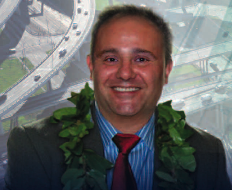Quoted in a story by Alexander Zannes in the Channel 2 News (KHON2) on narrower lanes for neighborhood streets, as follows.
Panos Prevedouros, chair of the Dept. of Civil and Environmental Engineering at the University of Hawaii says is a proven method to reduce speed, “In general I will tell you that if it is a neighborhood street, narrow lanes to a point are actually good at controlling the speed, again you have to be careful of wiggle room and having sideswipes if they overdo it.”
Panos Prevedouros, chair of the Dept. of Civil and Environmental Engineering at the University of Hawaii says is a proven method to reduce speed, “In general I will tell you that if it is a neighborhood street, narrow lanes to a point are actually good at controlling the speed, again you have to be careful of wiggle room and having sideswipes if they overdo it.”











